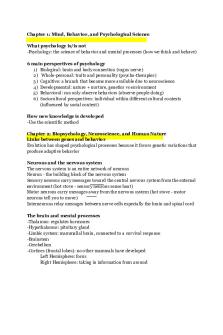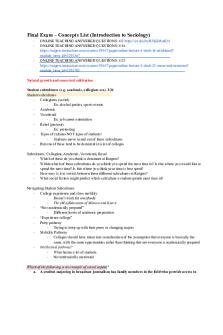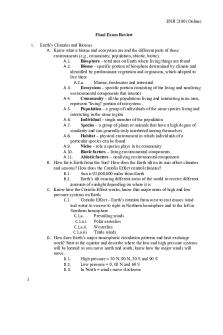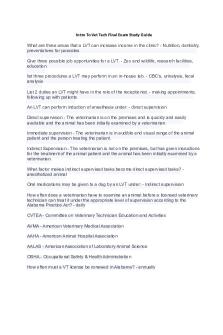Intro to Old Testament Final Exam and Final Paper Study Guide PDF

| Title | Intro to Old Testament Final Exam and Final Paper Study Guide |
|---|---|
| Author | Eric Aalo |
| Course | Old Testament |
| Institution | Florida Atlantic University |
| Pages | 21 |
| File Size | 108.3 KB |
| File Type | |
| Total Downloads | 95 |
| Total Views | 141 |
Summary
Download Intro to Old Testament Final Exam and Final Paper Study Guide PDF
Description
Amos 750 BCE (S/ N-Israel) Fig Farmer/herdsman Prophesizes in king's court M: social justice for poor/widow/orphan, covenant failure Upset w/ rich & royal, speaks to rich
Hosea 745-721 BCE (N /N-Israel) Married a prostitute Life // God & Israel's relationship (unfaithful marriage) M: polit/social/injustices, forbidden worship daily life metaphor, child-parent metaphor & marriage metaphor for Israel (divorces wife) kinships are important one of 1st writing prophets & longest of 12 minor prpht
1 Isaiah 740-700 BCE (S/S-Judah) M: "the Holy One of Israel", no foreign alliances, parable of the vineyard Tells king Hezekiah that the Babylonians are going to come & take everything before Babylon is destroyed by Jerusalem "call narrative", vision takes him to heaven, holy holy holy
Jeremiah 627-586 BCE (S /S-Judah)
"weeping prophet" M: Don't trust in the temple or the line of David for safety, surrender to Babylon! outcast Tells the exiles in Babylon to go plan, build houses, marry & give in marriage Reminds us of Dt. "temple of the Lord" Contemporary w/Ezekiel
Ezekiel 593-563 BCE (S /Babylon) One of the first wave exiles taken to Babylon Priest Acts out things to prove his point: charades, acting out what is to come for Jerusalem Sees the VISION Glory of the Lord leave the temple of Jerusalem to reside w/exiles in Babylon Valley of dry bones Contemporary w/Jer. eats scroll (word of God)
2 Isaiah Just before 539 BCE, near the end of the exile (Jewish prophet in Babylon) message: comfort/return
3 Isaiah Just after 539 BCE, early post-exilic period (Jewish prophet in the homeland, now a Persian province)
Haggai 520 BCE
(Jewish prophet in the homeland, now a Persian province) Priestly Source, Minor Prophet M: rebuild the temple Contemporary w/Ezra
Zechariah 520-518 BCE (Jewish prophet in the homeland, now a Persian province)
Jonah Post-exilic (Jewish prophet)
Daniel First half: late Persian or Greek period (?) Second half: 167-164 BCE (Jewish prophet)
Assyrian hegemony 900-600 BCE
The Syro-Ephraimite War DATE 734
Destruction of Israel DATE 722 BCE
Fall of Jerusalem DATE 586 BCE
The Babylonian Empire
612-539 BCE
The Persian Empire 539-331 BCE
End of the exile by decree of Cyrus DATE 538 BCE
First wave of the return under Sheshbazzar and Zerubbabel 538 BCE
Temple rebuilt DATE 516 BCE
Second wave under Ezra 458 BCE
Third wave under Nehemiah 445 BCE
Compare and contrast foretelling and forthtelling. Foretelling: predicting events that will happen in the future
Forthtelling: deals w/revelation of events which occurred in past, may deal w/present circumstances (ie: contemporary w/the prophet), or it can look forward to the future
Amos The first section consists of "oracles against the nations," what is the difference between the criteria that is used to judge
the foreign nations and the criteria used to judge Israel and Judah? •Israel & Judah: judged more harshly than other nations bc have unique relat w/God •Whatever Israel does affects world politics •Covenants est. w/God, are evaluated: Did they keep covenant? Do they love God?
Amos In 5:21-27, why does God say that he hates the festivals and offerings of the people? •Israelites were still worshiping other gods while sacrificing to God; they were doing actions to please both Gods "just to be safe" •Although performing the rituals of the Lord, intermingling it w/ idol worship (think back: Exodus)
Amos Why do many scholars believe that Amos ministered before the Assyrian threat? •They believe this because mention of a major earthquake : (enables scholars to estimate Amos's prophetic career to take place around 750 BCE) •Also he doesn't mention the Assyrians
Amos Why do some scholars think that Amos 9:13-15 is a later addition, perhaps written by someone else? •"I will restore the fortunes of my people Israel, and they shall rebuild the ruined cities and inhabit them" •This seems to be talking re: destruction of Jerusalem & Dividic dynasty (586 BCE), but is a later period in the history of Judah after the time of Amos •-->must be a later add'n to the book & not OG by Amos
Hosea What is one of the main images or metaphors that Hosea uses to describe the relationship between God and Israel? •metaphor1: marriage re: relat bn Yahweh & Israel: Yahweh's love for Israel remains despite Israel's repeated infidelity by worshipping other gods •metaphor2: re: relat of Yahweh & Israel is that of a parent & child
Hosea What kind of legal situation is being alluded to in Hosea 2:1-2? infidelity & adultery in the marriage covenant
1 Isaiah Describe Isaiah's call by God. •Isaiah has a vision: himself present for mtg. of divine council. •He sees God sitting on his throne, w members of his assembly present •God: "Whom shall I send, and who will go for us?" •Isaiah: "Here I am; send me!" •instructed to deliver a message that the ppl will reject
1 Isaiah What was the Syro-Ephraimite War and why is it important to Isaiah? Isaiah 7: SE War vs. Judah, vs. Assyria holy one of Israel no foreign alliances
1 Isaiah In 7:1-17, why does the prophet criticize foreign alliances? •showed that they did not trust in/have faith in God to protect them & sought instead the aid of foreign nations
Jeremiah Discuss the context of Jeremiah's ministry. Who was in power at the beginning of his work and who was in control at the end? Josiah/Bablyon •career lasted:13th year of Josiah - several years after the fall of Jerusalem when Babylon took power
Jeremiah Discuss Jeremiah's interaction with other prophets of his time (e.g., chapters 23, 28). •an outcast; everyone hated him bc he told them to surrender: Babylon, but they thought they were protected bc they had the temple &the line of David
Jeremiah How did Jeremiah's position with regard to the Babylonian attack and possible control of Judah differ from the other prophets ministering during the same period? •Jeremiah told the people to surrender to Babylon •angers the other prophets that said not to worry bc the temple & the line of David would protect Judah & its people •Other prophets were giving false messages of prosperity and peace
Jeremiah Chapters 30-31 are referred to as the Book of Consolation. Why is this section so important to understanding the essence of Jeremiah's prophetic message? •important bc w/in it, Jeremiah purchases a plot of land in Anathoth •= SYMBOLIC guarantee that after Jerusalem has been punished for its evil ways, they will return there from the exile in Babylon
Jeremiah Discuss 31:31-34. How is it similar to or different from the Sinai Covenant? •//Sinai covenant bc the law is being given--> people •Diff b/c it is not being given on stone tablets, it will now be written upon their hearts
Ezekiel How is the theme of individual responsibility in 18:2 (cf. also Jer. 31:29-30) a significant development in the tradition of
biblical thought, and what purpose does it serve for Ezekiel? •The ppl of Judah blamed the bad on the idea that it was previous generations sinfulness that caused their punishment of exile to Babylon •However, indv responsb. shows that each generation is accountable for its own sin, thus the punishment they face •Impt b/c it allows Ezekiel to interpret the exile to Babylon & destruction of Jerusalem as deserved punishments for the sins of those who themselves committed them
Ezekiel What are the main points of chapter 37 and why is it important to Ezekiel's ministry? •"The Valley of Dry Bones" •vision: Ezekiel by God •Israel was a dead nation, however God would restore her •As Ezekiel speaks to the dead, dry bones (Israel), they begin to come to life •symbolic of Israel not being under judgment forever & that God will restore Israel
Ezekiel Describe 2 ways that Ezekiel "modeled" the judgment that would happen Judah in the early chapters of the book. •One way Ezekiel "modeled" the judgment was by using bricks to make a model of the city; he then proceeds to smash it showing that the city was going to be destroyed •Another way he "modeled" the coming judgment was by rationing & making bread w barley & other things not usually used for bread to show that FAMINE was coming to Judah: GF Ezekiel bread
2 Isaiah Discuss 40:1-11 and 44:9-28 as characteristic of Second Isaiah's themes. message of comfort for exiled people, people who are suffering preparer of the messiah (NT: John the Baptist) make straight the highway --> return (made easy)
2 Isaiah
List two reasons why Second Isaiah is considered to be a separate from First Isaiah. ...
2 Isaiah What are the possibilities for who the "suffering servant" is in Isaiah 53? ...
Haggai What are the two chief issues for this prophet? •Rebuild the temple & awaken the Israelites: their responsibilities, obligations, & privileges of their covenant heritage
Zechariah What is the main issue for this prophet? PRIEST: apocalyptic literature ("hidden") need a deciphering code to figure this out writes during Haggai's time inviting people back home, reassuring message: build the temple (to honor God), and need to build God's house before your own houses observe commandments, fast
Zechariah Discuss Zechariah's use of apocalyptic language and imagery. Why is this something new and different from earlier prophecies? ...
Psalms What is Hebrew Parallelism and why is it important to studying biblical poetry? Psalms in Hebrew Alphabet beginning --> end written poetically
same or opposite ideas communicated line by line (78, 120)
Psalms List two different types of Psalms and explain how they are different. lamenting/imprecatory psalms: esp Ps 137 (exile, captivity) hymns of praise: esp Ps 140 (royal songs, songs of Zion, messianic songs, etc)
Ezra What are the problems that the Jews encounter in the book of Ezra during the first two waves of the return? Why does Ezra go to Jerusalem, and what does he discover when he gets there? •Many Jews didn't want to return bc they had est lives in Babylon: (rebuild, 2-3 generations later) •prob: needing to reest proper worship (rebuild altar, temple) •Younger generation=joyful, but those alive for Solomon's temple weep (returned exiles WONT let foreigners help build temple) •Foreigners=angry & try to discourage the building of the temple •Ezra discovers that the Jews are still marrying foreigners which angers him (loses it and pulls hair out, theological crisis, soln = ppl who are married must send away women/children)
Nehemiah Why does Nehemiah go to Jerusalem? What are the problems he discovers when he arrives? •Nehemiah goes to Jerusalem to rebuild the wall •He sees that there is a social class system starting to form (ppl w/resources won't share w/out pledge, Neh brings charge ag. nobles) •He discovers that they are not keeping the Sabbath day holy (treading wine, merchants) •He also discovers that the Jews had also began to marry foreign women again (Neh pulls hair out, reminds them of King Solomon's fate)
Nehemiah How does the question of foreign wives in both Ezra and Nehemiah fit into the context of post-exilic debates over foreigners?
•The foreign wives bring in their multitudes of Gods--> heavily influences the children, & sometimes the husbands as well •BAD for the Jewish tradition & religion, Shows a falling back into pre-exilic apostasy •Neh. demands no more intermarriage •Ezra goes as far as to demand foreign wives & children be sent away
Proverbs Discuss biblical Wisdom Literature. What books are considered to be Wisdom books, what is "wisdom," and list some of the recurring themes? re: daily life for young--> young man (women will not be out of sight) fear of the Lord, fools despise wisdom & instruction
Job In what way does Job question the assumptions of Proverbs, and how is his problem answered? ...
Job What is "disinterested righteousness" and why is it an important concept to understanding Job? ...
Ecclesiastes In what way does Ecclesiastes question the assumptions of Proverbs, and what is this book's answer to the problem? ...
Briefly discuss the Deuteronomistic History •A+B=C where A=Love God, B=Keep Covenant, and C= All is well •The Deuteronomic view of history assume that A or B is not right if things are not going well for you. If you love God & keep covenant, all will go well & there will be no problems.
•All world politics depend on Israel keeping covenant
Discuss the Persian empire. Who was the leader referred to as the "messiah" or "anointed"? How did its governmental policies differ from those of Babylon and why was this important for the Jews? •Cyrus the Great was the leader referred to as the "messiah" or "anointed" •The Persians were nicer than the Babylonians (Left Jews alone & Let Jews worship like they wanted, etc. as long as they paid taxes & coop, didn't destroy city or make them slaves like the Babylonians) •impt bc the Persians eventually let the Jews return to Jerusalem (even got $/supplies for return)
Compare and contrast the military policies for dealing with conquered peoples of the Assyrians, the Babylonians, and the Persians. Discuss how these policies impacted the course of biblical history. •Assyrians: Brutal: impalement on poles, etc., Assimilation of the conquered all across the empire
•Babylonians: 3 waves oWave 1: take the nobles and elite to Babylon and instill a puppet king oTake everyone else to Babylon and destroy the conquered city o"Clean up" phase
•Persians: Nicest of the three, Cooperative as long as they pay taxes to Persian empire, Leave people alone (free to worship, etc.) as long as they pay up.
Describe the political/social/economic situation under Jereboam II. Why might this have been a tough time for the message of Amos/Hosea? •Under Jereboam II It was a time of peace & expansion (ppl do not want to listen to Amos/Hosea prophesize abt neg things when there are no current problems) •Not worried abt violations of covenant, worshipping of other gods, critiques of social justices, etc.
How does Heschel say that the God of Israel is different from philosophical ideas or concepts of God? ...
Amos 5:21
I hate, I despise your festivals, and I take no delight in your solemn assemblies...5:24 But let justice roll down like waters, and righteousness like an everflowing stream.
Hosea 1:2 "Go, take for yourself a wife of whoredom and have children of whoredom, for the land commits great whoredom by forsaking the LORD."
Ezra 10:10 "You have trespassed and married foreign women, and so increased the guilt of Israel. 10:11 Now make confession to the LORD the God of your ancestors, and do his will; separate yourselves from the peoples of the land and from the foreign wives."
Nehemiah 2:3 I said to the king, "May the king live forever! Why should my face not be sad, when the city, the place of my ancestors' graves, lies waste, and its gates have been destroyed by fire?"
Job 1:21 He said, "Naked I came from my mother's womb, and naked shall I return there; the LORD gave, and the LORD has taken away; blessed be the name of the LORD."
Job 38:4 "Where were you when I laid the foundation of the earth? Tell me, if you have understanding.
Proverbs 1:7 The fear of the LORD is the beginning of knowledge; fools despise wisdom and instruction.
Ecclesiastes 12:13 The end of the matter; all has been heard. Fear God, and keep his commandments; for that is the whole duty of everyone.
Isaiah 6:1 In the year that King Uzziah died, I saw the Lord sitting on a throne, high and lofty; and the hem of his robe filled the temple.
Jeremiah 1:5 "Before I formed you in the womb I knew you, and before you were born I consecrated you; I appointed you a prophet to the nations."
Ezekiel 18:2 What do you mean by repeating this proverb concerning the land of Israel, "The parents have eaten sour grapes, and the children's teeth are set on edge"?
Ezekiel 18:3 As I live, says the Lord God, this proverb shall no more be used by you in Israel.
Canon The official list of books that make up the Bible. also known as Law, or Rule.
Canaan the Promise Land which God promised to His people in the Old Testament. Also Canaan is the name of Noah's grandson.
Joseph Oldest son of Jacob and Rachel
Joshua Moses's successor and he led the Israelites in their conquest of the Promise Land
Ehud a judge who was sent by God
Saul The first king of Israel, then was rejected by God because he did not follow his command
Aaron Brother of Moses and he was Israel's first priest
David he defeated Goliath as a young man in Saul's army
Noah Hero of the Biblical flood story, God directs him to build an arc
Ishmael Son of Abraham
Moses Leader of the exodus from Egypt to whom God gave his Laws to on Mount Sinai
Samson A Judge known for his great strength
The Philistines a group of the sea peoples, they failed to conquer the Egyptians. the bad and rebellious people of Israel
Tiamat the goddess of the salt water who is defeated by the storm go Marduk
Marduk
the storm god who defeated Tiamat and is the Chief god of babylon
Rebekah the wife of Isaac, mother of Esau and Jacob
Rachel the wife of Jacob and mother of Joseph
Sarah the wife of Abraham and mother of Isaac
Mt. Sinai the mountain of God, He gave the Israelites His Laws; the place where the 10 Commandments are given
Shema a Jewish tradition in which 3 experts are recited like a prayer
Theophany is known as the appearance of a god
Covenant known as a "contract" and in the bible its between God and the Israelites and God and Abraham
Suzerainty Vassal Treaty treaty that is made when one country or group conquers another
Anthropomorphism when God takes on or has human characteristics
TaNaKh the abbreviation of the Hebrew Bible, Torah, Neviim, Ketuvim
Pentateuch the first five books of the Bible
Torah the first three parts of the Hebrew Bible, or "Law"
Gilgamesh the hero of the Mesopotamian epic
Mt. Horeb the mountain where an angel appears to Moses in a burning bush
12 Tribes the 12 tribes of Israel are descended from the sons and grandsons of the Jewish forefather Jacob
Deuteronomy the 5th and last book of the pentateuch
Documentary Hypothesis The theory formulated by Julius Wellhausen in 1878, which explains the repetitions and inconsistencies in the first five books of the Bible, the Pentateuch, as the result of originally independent sources or documents having been combines over several centuries. the principal hypothetical sources are: J, E, D and P.
D-source the Deuteronomic source according to the Document Hypothesis, which is found almsot exclusively in the book of Deuteronomy. - uses Horeb not Sinai
J-source The Yahwist (or Jahwist) source according to the Documentary Hypothesis, found in the books of Genesis through Numbers. - Garden of Eden
E-source The Elohist source according to the Documentary Hypothesis, found in the books of Genesis through Numbers. - Plagues in Egypt, Abraham is a prophet
P-source The Priestly source according to the Documentary Hypothesis, found in the books of Genesis through Numbers and at the end of the book of Deuter...
Similar Free PDFs

Intro to Stats Final Study Guide
- 15 Pages

Final Exam Study Guide- final
- 3 Pages

Intro To Psych Final Exam
- 24 Pages

Final Exam study guide
- 40 Pages

Final Exam Study guide
- 2 Pages

Final Exam Study Guide
- 105 Pages

Final Exam Study Guide
- 5 Pages

Final Exam Study Guide
- 14 Pages
Popular Institutions
- Tinajero National High School - Annex
- Politeknik Caltex Riau
- Yokohama City University
- SGT University
- University of Al-Qadisiyah
- Divine Word College of Vigan
- Techniek College Rotterdam
- Universidade de Santiago
- Universiti Teknologi MARA Cawangan Johor Kampus Pasir Gudang
- Poltekkes Kemenkes Yogyakarta
- Baguio City National High School
- Colegio san marcos
- preparatoria uno
- Centro de Bachillerato Tecnológico Industrial y de Servicios No. 107
- Dalian Maritime University
- Quang Trung Secondary School
- Colegio Tecnológico en Informática
- Corporación Regional de Educación Superior
- Grupo CEDVA
- Dar Al Uloom University
- Centro de Estudios Preuniversitarios de la Universidad Nacional de Ingeniería
- 上智大学
- Aakash International School, Nuna Majara
- San Felipe Neri Catholic School
- Kang Chiao International School - New Taipei City
- Misamis Occidental National High School
- Institución Educativa Escuela Normal Juan Ladrilleros
- Kolehiyo ng Pantukan
- Batanes State College
- Instituto Continental
- Sekolah Menengah Kejuruan Kesehatan Kaltara (Tarakan)
- Colegio de La Inmaculada Concepcion - Cebu







